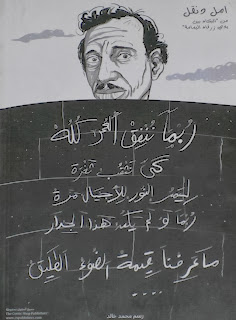 |
| TokTok #3 Front cover |
 |
| The TokTok editorial team (RTL): Makhlūf, Shinnāwī, Tawfīq, Hishām Raḥmah, ʿAbd Allāh, ʾAndīl |
For the historical record: all three have a background in arts, and have 'real' jobs as illustrators/ caricaturists with Egyptian newspapers. The magazine began as an amateur (with a capital 'A', and a French accent) experiment before the 2011 revolution: the project of the magazine was first offered to two (unnamed) publishers, both of which refused, for various reasons, leading the group to publish themselves. Despite a lack of a formal distribution network (apparently, one has to publish an edition of at least 5000 copies to distribute via existing distributors; TokTok currently has an edition of 1000 copies), the magazine was a success, and has developed a relatively small, but faithful following -- students of the Fine Arts department, to begin with, but now it attracts readers from all walks of life.
 |
| TokTok #3 Page 1 and impressum |
Here we come to the part that didn't appeal to the publishers: The magazine has warning on its cover: يحفظ بعيدا عن متناول الاطفال - Keep out of reach of children ... maybe because some of its content is graphic (as in 'explicit'), or because the texts contain sexual innuendo (or WORSE. Shush.). I read that the makers of Metro had themselves arrested and fined for infringing public decency, so this is not a trivial issue for publishers and artists alike.
It was interesting to hear ʾAndīl about the group's experience in offering the content to publishers. Because the concept is relatively new to the Egyptian market, publishers were reportedly not able to categorize the concept, or appreciate it fully. The artist also pointed out that the rough draft is less appealing that the finished product, and therefore tougher to sell. Responding to questions about alleged 'indecency' , the makers of TokTok pointed out that many recent novels contain language that is far more explicit than their magazine, and yet pass the censor without delay.
I am still trying to find out how one can buy an entire set of the magazine, and when I do, I'll add a note here that leads to the source. Enjoy.




